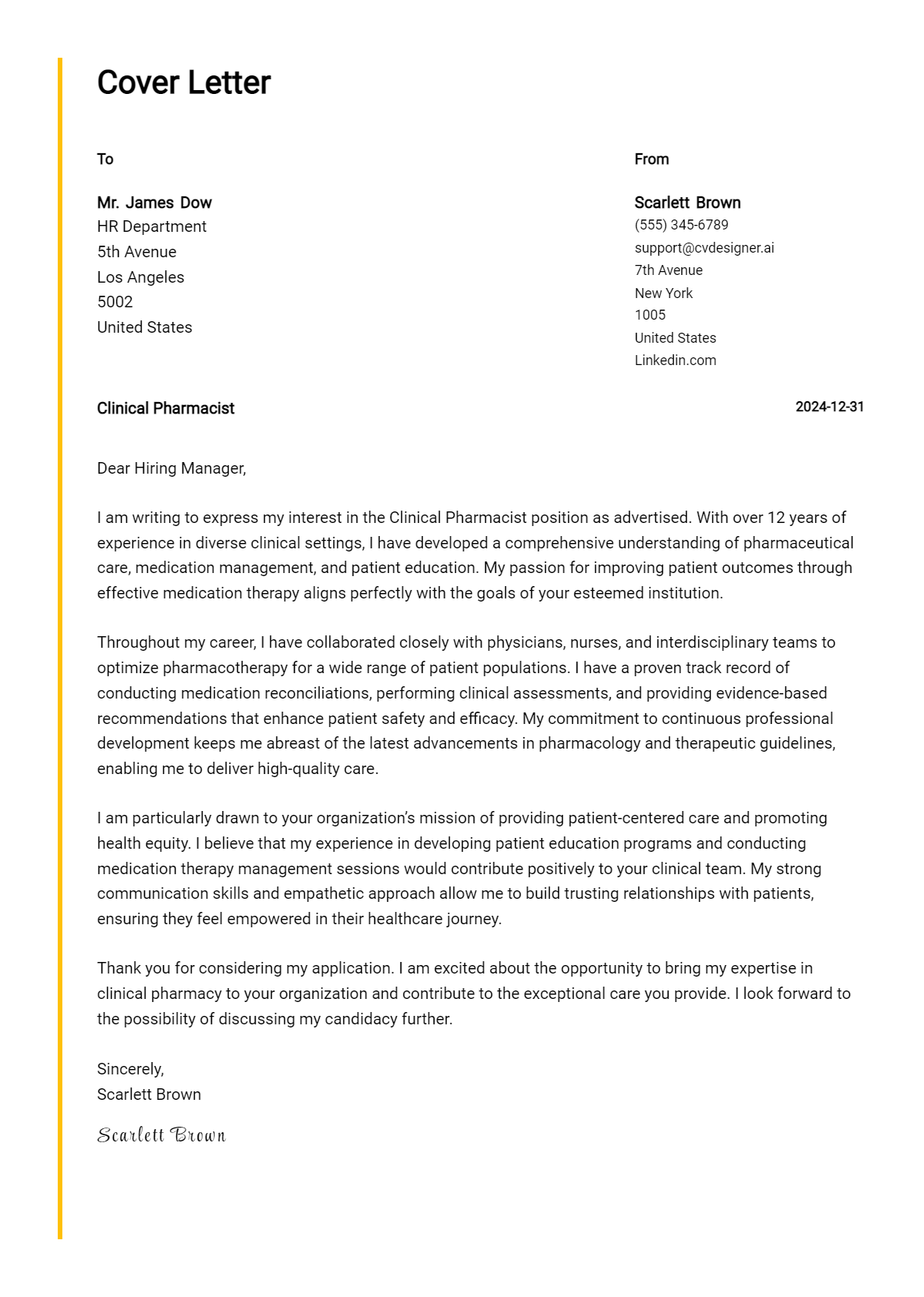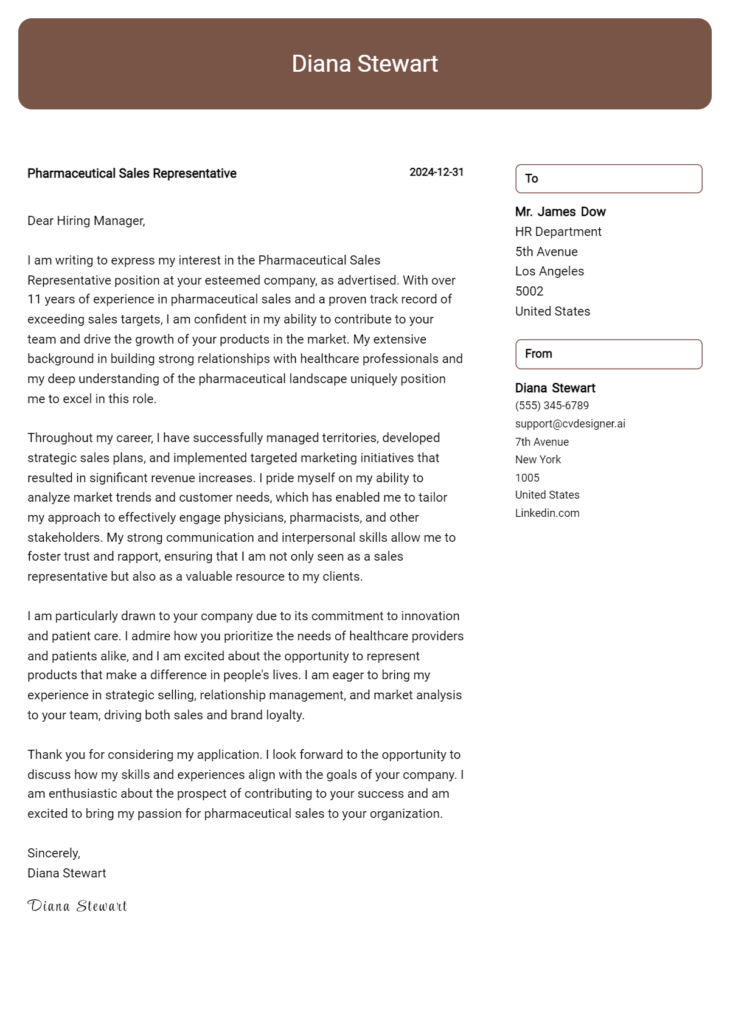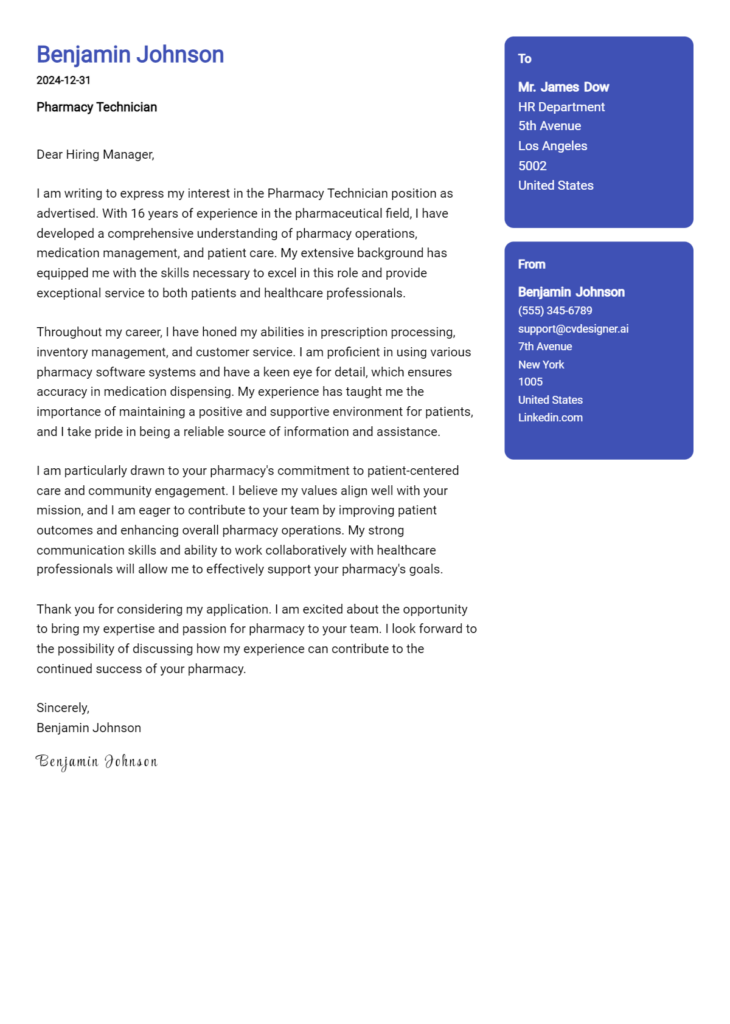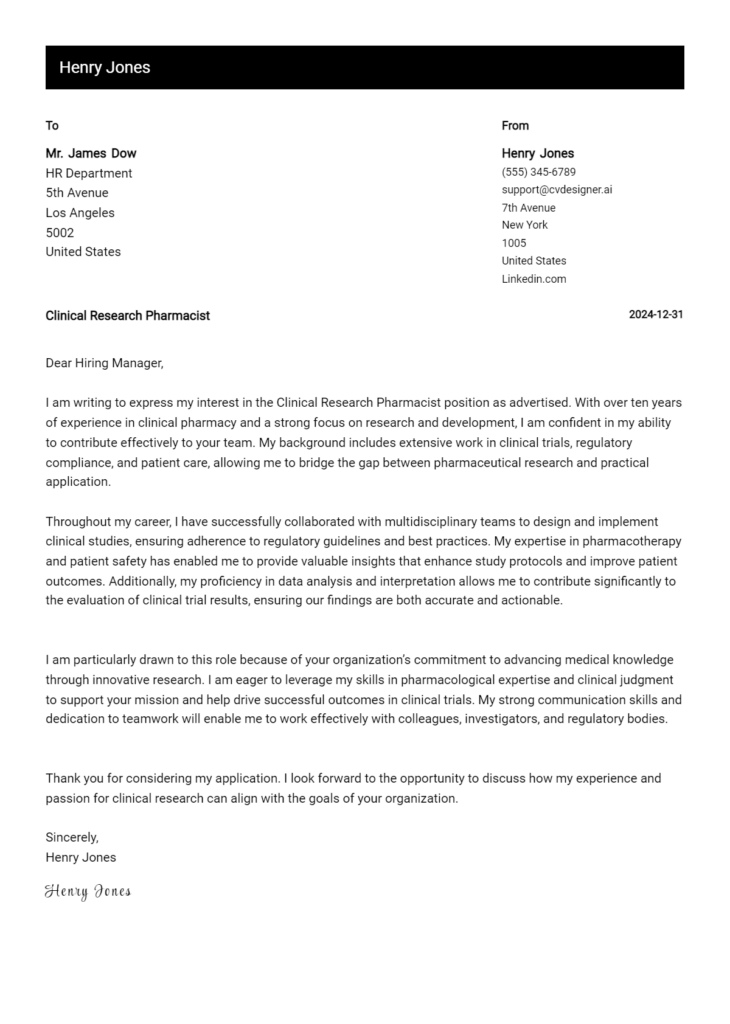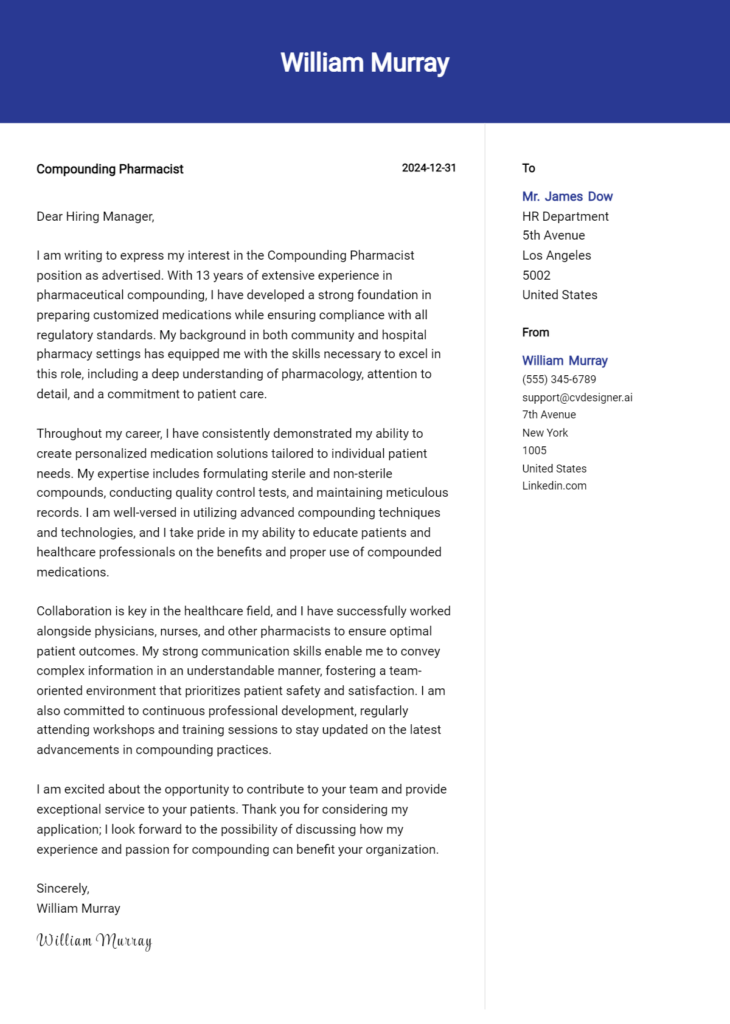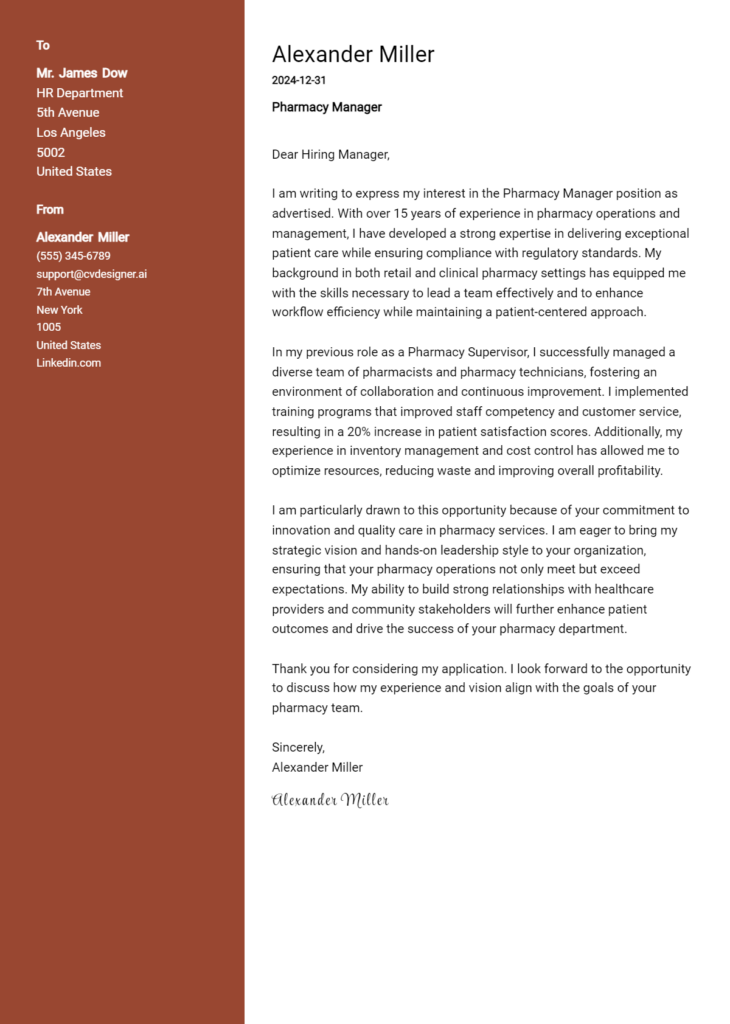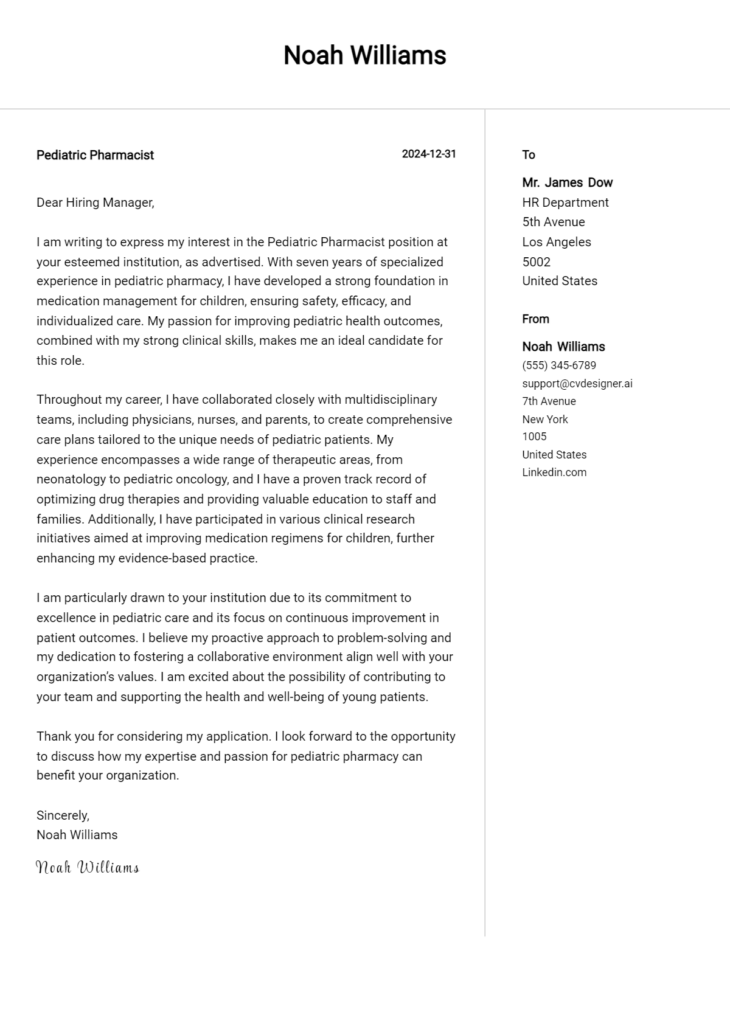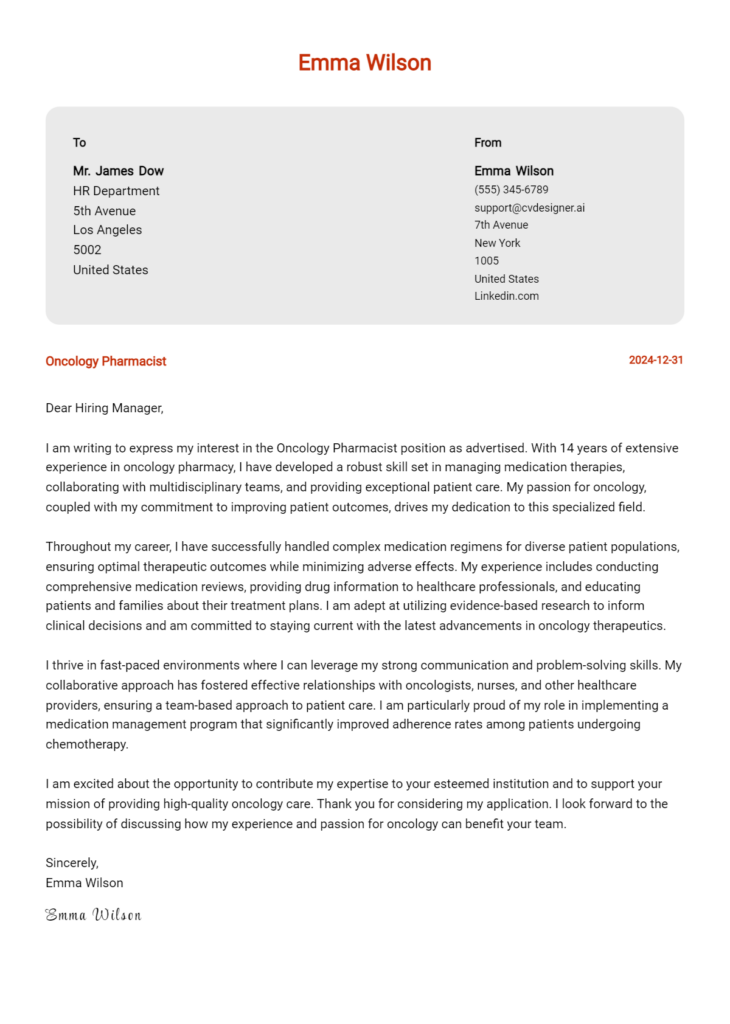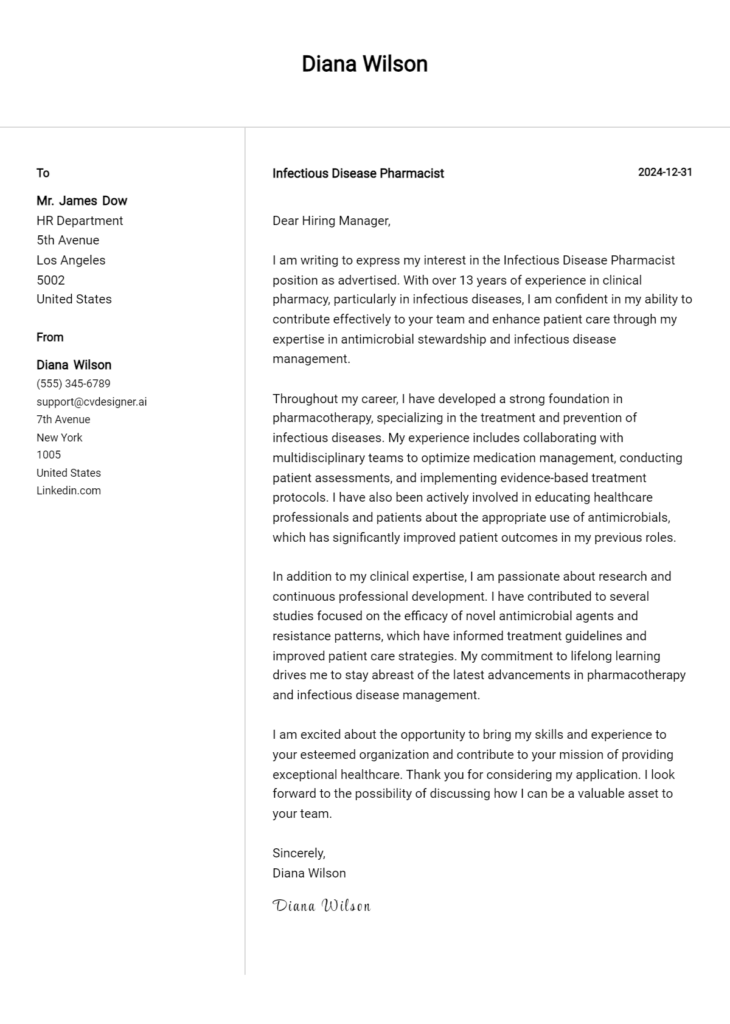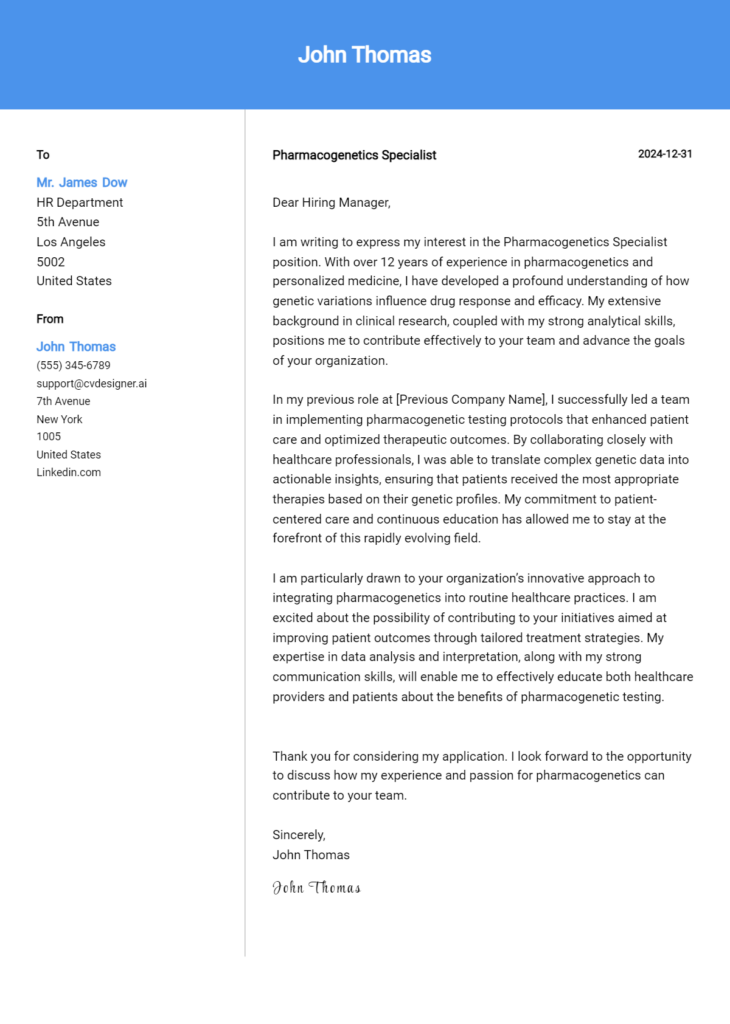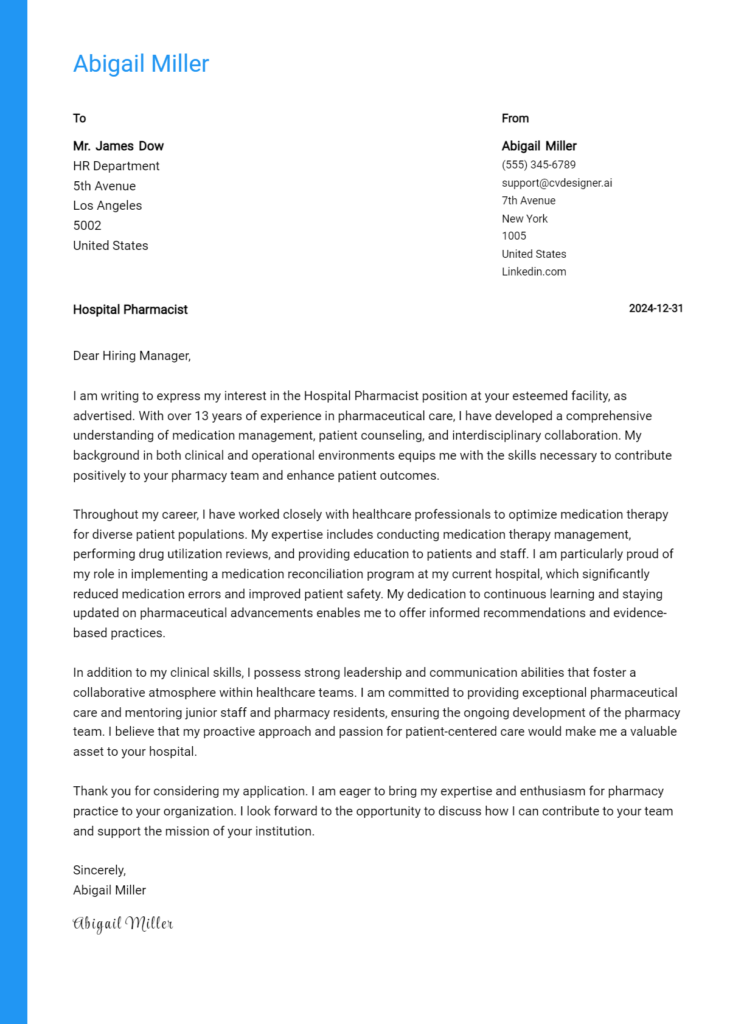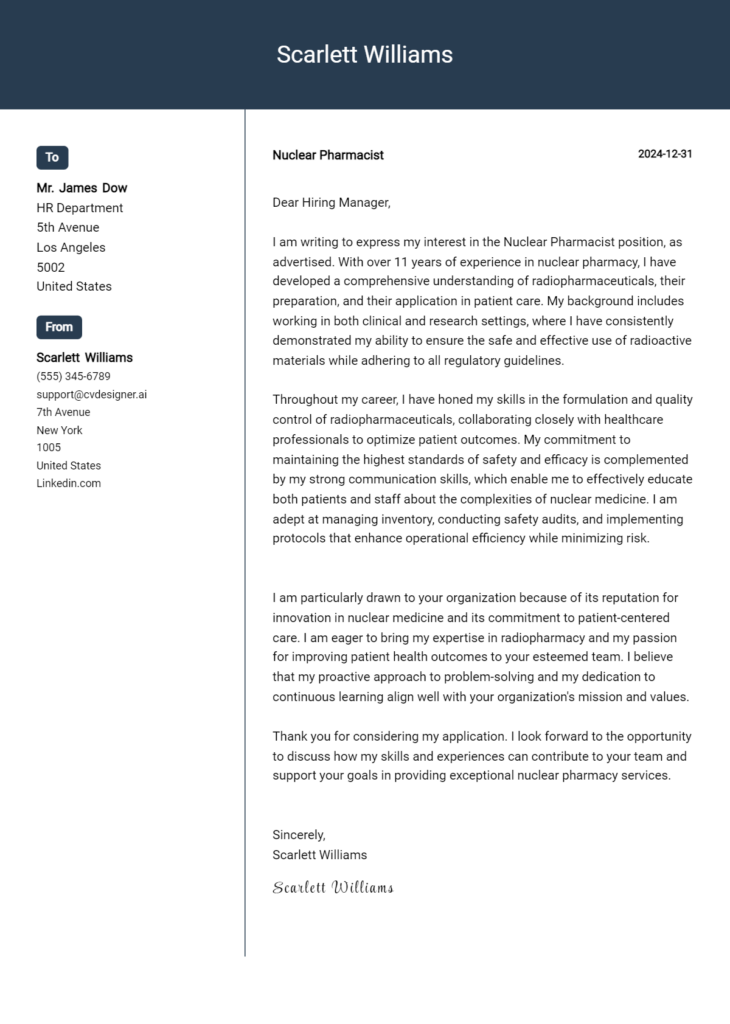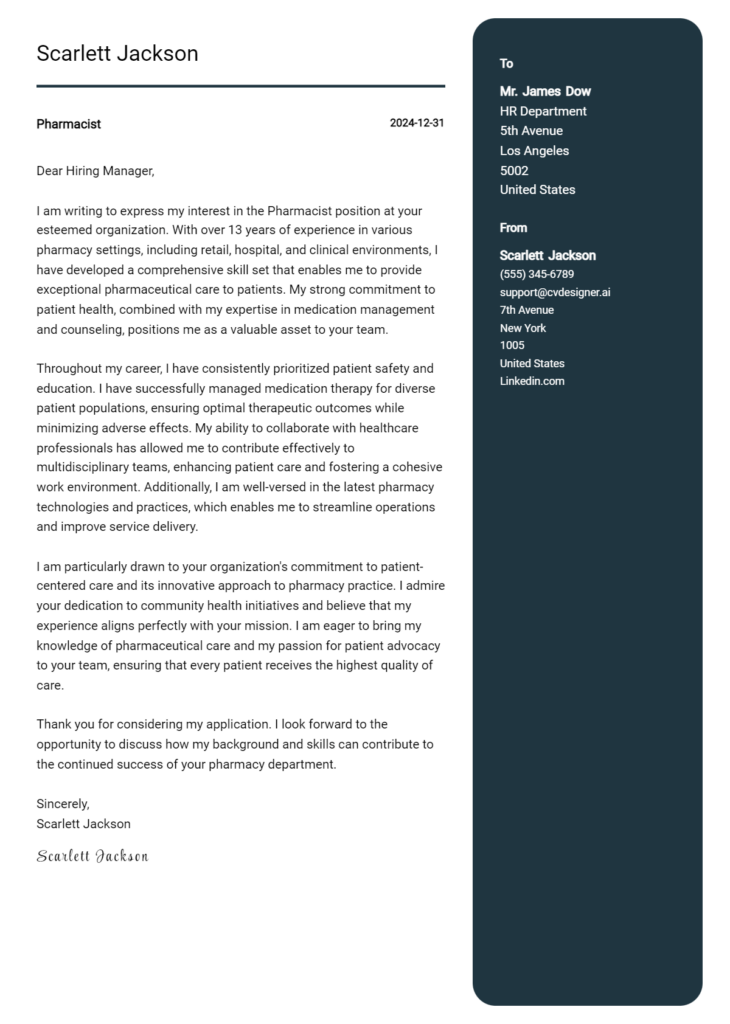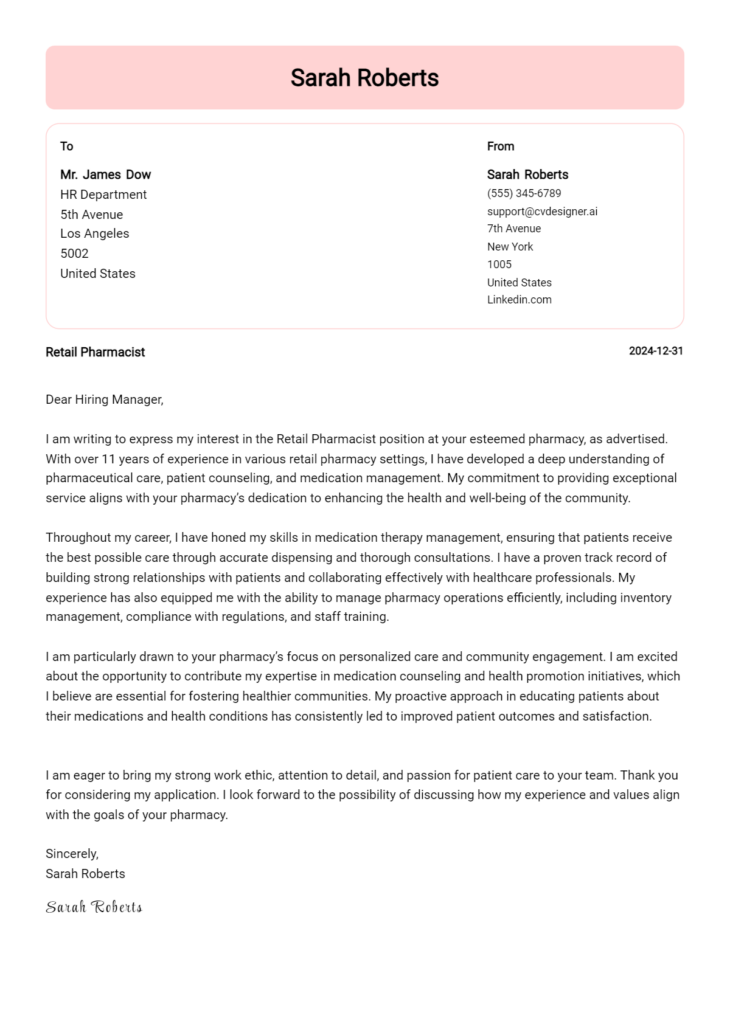Clinical Pharmacist Cover Letter Examples
Explore additional Clinical Pharmacist cover letter samples and guides and see what works for your level of experience or role.
How to Format a Clinical Pharmacist Cover Letter?
Crafting a compelling cover letter is crucial for Clinical Pharmacists, as it not only showcases your qualifications but also reflects your ability to communicate effectively in a healthcare setting. The format of your cover letter serves as a first impression, allowing you to demonstrate your attention to detail, organization, and professionalism—qualities that are essential in the pharmaceutical field.
In this guide, we will outline how to structure your cover letter, offering insights and specific examples tailored for Clinical Pharmacists to help you create an impactful document.
We will focus on the essential components of a professional cover letter, including:
- Cover Letter Header
- Cover Letter Greeting
- Cover Letter Introduction
- Cover Letter Body
- Cover Letter Closing
Each section is integral to highlighting your skills and demonstrating your suitability for the role. Let’s break down each part and explain how to make your Clinical Pharmacist cover letter stand out.
Importance of the Cover Letter Header for a Clinical Pharmacist
The cover letter header is a crucial component of a professional application, particularly for a Clinical Pharmacist position. It establishes the first impression and sets the tone for the entire document. A well-structured header should include your contact information, the date, and the recipient's details, ensuring clarity and professionalism. This not only helps the hiring manager identify your application quickly but also demonstrates your attention to detail and organizational skills, which are essential in the healthcare field.
A strong cover letter header conveys all necessary information succinctly, while a weak header can lead to confusion or a lack of professionalism. Below are examples to illustrate the difference:
Strong Example
John Doe 123 Main Street Anytown, ST 12345 (123) 456-7890 johndoe@email.com October 1, 2023 Dr. Jane Smith Pharmacy Director ABC Hospital 456 Healthcare Blvd Anytown, ST 12345
Weak Example
John D 123 Main St Anytown 10/1/23 To Whom It May Concern
The Importance of the Cover Letter Greeting
The greeting of a cover letter is crucial as it sets the tone for the entire document and establishes an immediate connection with the reader. A well-crafted greeting not only demonstrates professionalism but also shows a level of personalization that can distinguish you from other candidates. By directly addressing the hiring manager, you convey respect and acknowledge their role in the hiring process. To enhance the effectiveness of your greeting, avoid generic salutations like "To Whom It May Concern." Instead, take the time to research the recipient's name, which may be available on the company’s website or LinkedIn. This small effort can make a significant difference in how your application is received.
Strong Example
Dear Dr. Smith,
Weak Example
To Whom It May Concern,
The Importance of a Compelling Cover Letter Introduction for a Clinical Pharmacist
A well-crafted cover letter introduction is crucial for a Clinical Pharmacist as it serves as the first impression to the hiring manager. This opening paragraph should not only capture attention but also express genuine interest in the role while briefly highlighting key skills or relevant achievements. A strong introduction can set the tone for the rest of the cover letter and demonstrate the candidate's enthusiasm and qualifications, making them stand out in a competitive job market.
Strong Example
Dear Hiring Manager, As a dedicated Clinical Pharmacist with over five years of experience in hospital settings, I am excited to apply for the Clinical Pharmacist position at [Company Name]. My passion for optimizing patient care through medication management, combined with a proven track record of collaborating with healthcare teams to implement effective pharmaceutical care plans, aligns perfectly with your organization's commitment to excellence in patient outcomes. I am eager to bring my expertise in pharmacotherapy and patient education to your esteemed institution.
Weak Example
To Whom It May Concern, I am writing to apply for the Clinical Pharmacist role. I have worked in pharmacy for a while and have some experience. I think I would be a decent fit for the job. Thank you for considering my application.
Purpose of the Cover Letter Body for a Clinical Pharmacist
The body of a cover letter for a Clinical Pharmacist serves as a critical platform for candidates to articulate their qualifications, relevant experiences, and the unique value they bring to the prospective employer. This section should effectively highlight specific projects or accomplishments that demonstrate the candidate’s expertise in pharmacotherapy, medication management, and patient care. By detailing instances where they have successfully collaborated with healthcare teams, implemented medication protocols, or improved patient outcomes through innovative strategies, candidates can create a compelling narrative that aligns their skills with the needs of the organization.
Strong Example
During my tenure at XYZ Hospital, I led a multidisciplinary initiative to reduce medication errors by 30% through the development of a comprehensive medication reconciliation program. This project not only enhanced patient safety but also improved the workflow for the nursing staff. Furthermore, I played a pivotal role in a clinical trial that evaluated the efficacy of a new anticoagulant, resulting in a publication in a peer-reviewed journal. My ability to analyze complex medication regimens and collaborate effectively with physicians and nursing staff has consistently resulted in improved patient outcomes and satisfaction scores.
Weak Example
I have worked as a Clinical Pharmacist for several years and have done various tasks. I am familiar with medication management and have helped some patients. I think I would be a good fit for your team because I have experience in the field.
Importance of the Cover Letter Closing for a Clinical Pharmacist
The closing paragraph of a cover letter is crucial as it serves to summarize your qualifications, reiterate your enthusiasm for the Clinical Pharmacist position, and encourage the employer to take the next steps, such as reviewing your resume or scheduling an interview. A strong closing leaves a lasting impression, while a weak one might undermine your overall application.
Strong Example
I am excited about the opportunity to contribute my extensive experience in clinical pharmacology and patient care to your esteemed team at [Company Name]. With a proven track record of optimizing medication therapies and collaborating with healthcare professionals, I am confident in my ability to enhance patient outcomes. I look forward to the possibility of discussing my qualifications further and am eager to bring my passion for pharmaceutical care to your organization. Please feel free to review my resume for additional details, and I hope to schedule an interview soon to explore how I can contribute to your team's success.
Weak Example
Thank you for considering my application. I think I'm a good fit for the Clinical Pharmacist role. I hope you like my resume. Let me know if you want to talk.
Crafting an effective cover letter for a Clinical Pharmacist position is essential in standing out among candidates. This letter serves as your first impression, allowing you to showcase your technical skills, problem-solving abilities, knowledge of the Software Development Life Cycle (SDLC), teamwork capabilities, and a passion for continuous learning. Here are some tips to help you create a compelling cover letter that highlights these key areas.
Tips for Writing an Effective Cover Letter for Clinical Pharmacists
Highlight Your Technical Skills
Begin your cover letter by emphasizing your technical expertise in pharmacology, medication management, and drug therapy. Mention specific software or tools you are proficient in that are relevant to the role, such as Electronic Health Records (EHR) systems. This will demonstrate your readiness to tackle the technical aspects of the job.Showcase Problem-Solving Abilities
Use concrete examples to illustrate your problem-solving skills. Describe a situation where you identified a potential medication error and how you addressed it. This shows your ability to think critically and act decisively, which is crucial in a clinical setting.Include SDLC Knowledge
If applicable, mention any experience you have with the Software Development Life Cycle (SDLC). Explain how understanding this process has helped you in implementing new pharmacy systems or improving existing workflows. This knowledge can be a unique asset in a clinical pharmacy environment that increasingly relies on technology.Emphasize Teamwork
Collaborating with healthcare professionals is a significant aspect of a Clinical Pharmacist's role. Share examples of successful teamwork, such as working with physicians and nursing staff to optimize patient care. Highlighting your ability to communicate effectively and work harmoniously in a team can set you apart from other candidates.Express a Passion for Continuous Learning
The field of pharmacy is always evolving, so it’s crucial to convey your commitment to continuous professional development. Mention any certifications, training, or relevant courses you’ve completed recently. This not only shows your dedication but also your adaptability to new practices and guidelines.
Incorporating these tips into your cover letter will help you create a strong application that reflects your qualifications as a Clinical Pharmacist. For more guidance, you can explore cover letter templates or use a cover letter builder to streamline your writing process.
Common Mistakes to Avoid in a Clinical Pharmacist Cover Letter
Crafting a compelling cover letter is essential for standing out in the competitive field of clinical pharmacy. Avoiding common mistakes can significantly enhance your chances of making a positive impression on potential employers. Here are some frequent pitfalls to watch out for:
Generic Greetings: Using a vague salutation like "To Whom It May Concern" can come off as impersonal. Instead, do your research and address the hiring manager by name.
Failing to Tailor Content: Sending a one-size-fits-all cover letter may indicate a lack of genuine interest. Customize your letter for each position, highlighting relevant experiences and skills.
Overemphasizing Responsibilities: Focusing too much on job duties instead of achievements can weaken your case. Use quantifiable results to showcase your impact in previous roles.
Neglecting Formatting: A cluttered or unprofessional layout can detract from your message. Follow a clear cover letter format to ensure readability and professionalism.
Ignoring the Job Description: Not referencing specific qualifications mentioned in the job listing may signal that you haven't fully engaged with the role. Align your skills with their needs to demonstrate your fit.
Excessive Length: A cover letter that is too long can lose the reader's attention. Aim for a concise, focused letter that clearly communicates your points in a few paragraphs.
Typos and Errors: Spelling or grammatical mistakes can undermine your professionalism. Always proofread your cover letter and consider asking a colleague to review it.
By steering clear of these common mistakes and following best practices, you can create a strong cover letter that effectively showcases your qualifications as a clinical pharmacist. For inspiration, check out these cover letter examples.
Cover Letter FAQs for Clinical Pharmacist
What should I include in my cover letter as a Clinical Pharmacist?
In your cover letter, it's essential to highlight your relevant education, licensure, and experience in clinical pharmacy. Start with a strong introduction that mentions the position you're applying for and how your skills align with the job requirements. Include specific examples of your clinical expertise, such as medication management, patient counseling, or collaboration with healthcare teams. Discuss any specialized training or certifications, like Board Certification in Pharmacotherapy (BCPS). Additionally, emphasize your soft skills, such as communication and problem-solving abilities, which are crucial in patient care settings. Finally, express your passion for improving patient outcomes through effective medication therapy management.
How do I tailor my cover letter for a specific job?
To tailor your cover letter for a specific Clinical Pharmacist position, carefully read the job description and identify key qualifications and responsibilities. Align your experiences and skills with these requirements by mentioning specific achievements that demonstrate your capabilities. Use keywords from the job posting, such as "interdisciplinary teamwork" or "patient-centered care," to show you understand the role's focus. Additionally, research the institution’s values and mission to reflect a shared commitment in your cover letter. Personalizing your letter not only shows your genuine interest in the position but also makes it easier for hiring managers to see how you'd fit into their team.
How long should my cover letter be?
Your cover letter for a Clinical Pharmacist position should ideally be one page long, consisting of three to four paragraphs. Aim for concise, clear writing that gets straight to the point while still showcasing your qualifications and enthusiasm for the role. Use a standard business format, with proper spacing and margins, to ensure readability. Avoid overly lengthy explanations; instead, focus on highlighting your most relevant experiences and skills. A well-organized cover letter that is succinct yet informative is more likely to capture the attention of hiring managers, increasing your chances of being invited for an interview.
Should I include my salary expectations in my cover letter?
Generally, it’s not advisable to include salary expectations in your cover letter unless specifically requested in the job posting. Focus on highlighting your qualifications, experiences, and enthusiasm for the Clinical Pharmacist position instead. If the employer asks for salary expectations, you can address them in the interview or in a follow-up communication after you have had the opportunity to discuss the position in detail. By waiting to discuss compensation, you allow yourself to better understand the role and the organization’s needs, which can give you a stronger position in negotiations should you receive a job offer.
Build your Cover Letter in minutes
Use an AI-powered cover letter builder and have your letter done in 5 minutes. Just select your template and our software will guide you through the process.

